unit9 health and diseases
英语名校课堂背记本九上7~9单元
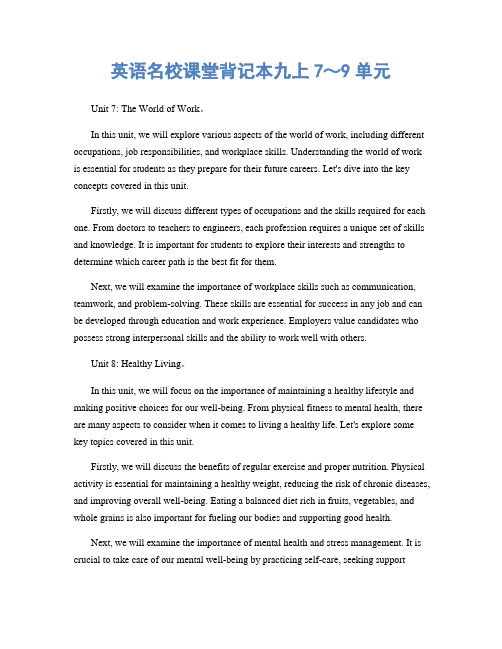
英语名校课堂背记本九上7~9单元Unit 7: The World of Work。
In this unit, we will explore various aspects of the world of work, including different occupations, job responsibilities, and workplace skills. Understanding the world of work is essential for students as they prepare for their future careers. Let's dive into the key concepts covered in this unit.Firstly, we will discuss different types of occupations and the skills required for each one. From doctors to teachers to engineers, each profession requires a unique set of skills and knowledge. It is important for students to explore their interests and strengths to determine which career path is the best fit for them.Next, we will examine the importance of workplace skills such as communication, teamwork, and problem-solving. These skills are essential for success in any job and can be developed through education and work experience. Employers value candidates who possess strong interpersonal skills and the ability to work well with others.Unit 8: Healthy Living。
九年级全册英语重点单词归纳
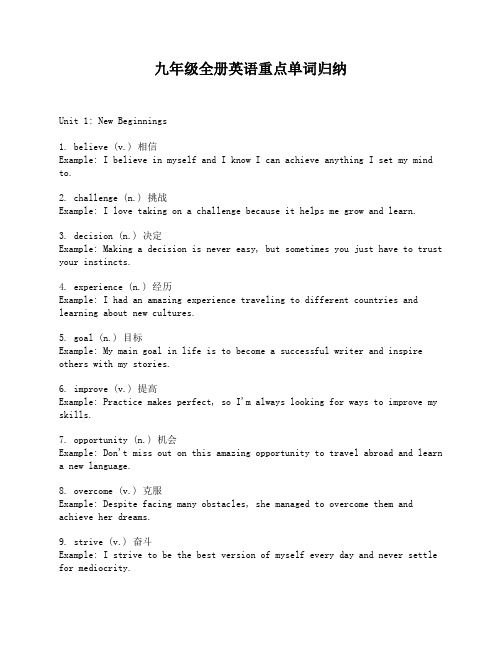
九年级全册英语重点单词归纳Unit 1: New Beginnings1. believe (v.) 相信Example: I believe in myself and I know I can achieve anything I set my mind to.2. challenge (n.) 挑战Example: I love taking on a challenge because it helps me grow and learn.3. decision (n.) 决定Example: Making a decision is never easy, but sometimes you just have to trust your instincts.4. experience (n.) 经历Example: I had an amazing experience traveling to different countries and learning about new cultures.5. goal (n.) 目标Example: My main goal in life is to become a successful writer and inspire others with my stories.6. improve (v.) 提高Example: Practice makes perfect, so I'm always looking for ways to improve my skills.7. opportunity (n.) 机会Example: Don't miss out on this amazing opportunity to travel abroad and learn a new language.8. overcome (v.) 克服Example: Despite facing many obstacles, she managed to overcome them and achieve her dreams.9. strive (v.) 奋斗Example: I strive to be the best version of myself every day and never settle for mediocrity.10. unique (adj.) 独特的Example: Each person has their own unique qualities that make them special and worth knowing.Unit 2: Going Global1. communication (n.) 沟通Example: Good communication skills are essential for building strong relationships.2. global (adj.) 全球的Example: In today's global economy, it's important to have a broad understanding of different cultures.3. impact (n.) 影响Example: His speech had a great impact on the audience and inspired many people.4. opportunity (n.) 机会Example: Studying abroad offers a great opportunity to learn a new language and experience a different culture.5. recognize (v.) 认出Example: I couldn't recognize her at first because she had changed so much over the years.6. society (n.) 社会Example: It is important for individuals to contribute to society and make a positive difference.7. tradition (n.) 传统Example: Every year, we gather together as a family to celebrate our cultural traditions.8. view (n.) 观点Example: Everyone has their own unique point of view, and it's important to respect and listen to others.9. worldwide (adj.) 世界范围的Example: The internet has made it possible for people to connect with others worldwide.10. youth (n.) 青少年Example: The youth of today are the leaders of tomorrow, so it's important to invest in their education and development.Unit 3: Incredible Stories1. adventure (n.) 冒险Example: Going on an adventure allows you to step out of your comfort zone and experience new things.2. ancient (adj.) 古老的Example: The ancient ruins are a testament to the rich history of this country.3. creature (n.) 生物Example: The deep sea is home to many unique and fascinating creatures.4. danger (n.) 危险Example: Climbing Mount Everest is not for the faint of heart, as it is filled with many dangers.5. escape (v.) 逃离Example: The prisoners managed to escape from their cells using a secret tunnel.6. legend (n.) 传说Example: This story has become a legend in our family, passed down from generation to generation.7. treasure (n.) 宝藏Example: Pirates often went on adventures in search of hidden treasures.8. voyage (n.) 航行Example: The explorers embarked on a voyage to discover new lands and trade routes.9. witness (v.) 目击Example: I was a witness to the car accident and had to testify in court.10. mystery (n.) 神秘Example: The disappearance of the missing hiker remains a mystery to this day.Unit 4: Science and Technology1. advance (n.) 进步Example: The latest advance in technology has revolutionized the way we live our lives.2. discover (v.) 发现Example: Scientists discovered a new species of dinosaur in the remote jungle.3. experiment (n.) 实验Example: The chemistry class conducted an experiment to see how different substances react with each other.4. invention (n.) 发明Example: The light bulb is one of Thomas Edison's most famous inventions.5. research (n.) 研究Example: He spent years conducting extensive research on the effects of climate change.6. scientist (n.) 科学家Example: Many great scientists have dedicated their lives to making groundbreaking discoveries.7. technology (n.) 技术Example: The rapid advancement of technology has greatly improved our quality of life.8. theory (n.) 理论Example: Einstein's theory of relativity revolutionized our understanding of space and time.9. universe (n.) 宇宙Example: The universe is vast and full of mysteries waiting to be explored.10. experiment (v.) 实验Example: The students were excited to experiment with different chemicals in the lab.Unit 5: Heroes1. courage (n.) 勇气Example: It takes a lot of courage to stand up for what you believe in, even when faced with opposition.2. hero (n.) 英雄Example: Firefighters are often seen as heroes because they put their lives on the line to save others.3. inspire (v.) 激励Example: Her determination and hard work inspire me to never give up on my dreams.4. sacrifice (n.) 牺牲Example: Soldiers make great sacrifices to protect their country and ensureits safety.5. bravery (n.) 勇敢Example: The young boy showed bravery by confronting the bully and standing up for his classmate.6. legend (n.) 传奇Example: Michael Jordan is a basketball legend who inspired a whole generation of athletes.7. respect (n.) 尊重Example: It's important to treat everyone with respect and kindness, regardless of their background or beliefs.8. selfless (adj.) 无私的Example: Mother Teresa dedicated her life to helping the poor and needy, showing selfless love and compassion.9. admire (v.) 钦佩Example: I admire her for her resilience and determination to overcome any challenges that come her way.10. honor (n.) 荣誉Example: He was awarded a medal of honor for his brave actions during the war.Unit 6: Healthy Living1. diet (n.) 饮食Example: A balanced diet is essential for maintaining good health and preventing diseases.2. exercise (n.) 锻炼Example: Regular exercise can help improve cardiovascular health and strengthen muscles.3. lifestyle (n.) 生活方式Example: Adopting a healthy lifestyle involves making mindful choices about what we eat and how active we are.4. nutrition (n.) 营养Example: The nutritionist advised me to eat a variety of fruits and vegetables to ensure I get all the necessary nutrients.5. physical (adj.) 身体的Example: Regular physical activity is important for maintaining a healthy weight and reducing the risk of chronic diseases.6. sleep (n.) 睡眠Example: Lack of sleep can negatively impact our mood and cognitive functioning.7. stress (n.) 压力Example: Learning effective stress management techniques can help reduce the negative effects of stress on our health.8. wellbeing (n.) 健康Example: Mental and emotional wellbeing are just as important as physical health.9. balance (n.) 平衡Example: Finding a balance between work, social life, and personal time is crucial for overall wellbeing.10. hygiene (n.) 卫生Example: Good personal hygiene, such as regular handwashing, can help prevent the spread of germs and diseases.Unit 7: Nature and the Environment1. conservation (n.) 保护Example: The conservation of natural resources is important for the sustainability of our planet.2. environment (n.) 环境Example: We must take care of our environment and make conscious choices to reduce pollution and waste.3. pollution (n.) 污染Example: Air pollution from factories and vehicles is a major concern forpublic health.4. recycle (v.) 回收利用Example: Recycling paper and plastic helps reduce waste and conserve resources.5. renewable (adj.) 可再生的Example: Solar and wind energy are examples of renewable energy sources.6. species (n.) 物种Example: Many endangered species are at risk of extinction due to loss of habitat.7. deforestation (n.) 森林砍伐Example: Deforestation is causing the loss of biodiversity and contributes to climate change.8. ecosystem (n.) 生态系统Example: A healthy ecosystem relies on the balance between different species and their environment.9. natural (adj.) 自然的Example: National parks are protected areas that preserve the natural beauty and wildlife.10. waste (n.) 浪费Example: The excessive use of plastic contributes to waste and pollution inour environment.Unit 8: Society and Culture1. celebrate (v.) 庆祝Example: We celebrate birthdays to mark the day of our birth and show appreciation for another year of life.2. community (n.) 社区Example: Getting involved in your local community can help build social connections and make a positive impact.3. culture (n.) 文化Example: Each country has its own unique culture, including language, traditions, and customs.4. festival (n.) 节日Example: Chinese New Year is a major festival celebrated by people of Chinese descent all over the world.5. tradition (n.) 传统Example: It is important to preserve and pass on cultural traditions from one generation to the next.6. diversity (n.) 多样性Example: Cultural diversity enriches our society and allows us to learn from one another's experiences and perspectives.7. language (n.) 语言Example: Learning a foreign language opens up opportunities for communication and understanding with people from different cultures.8. society (n.) 社会Example: A just and equitable society is one where everyone has equal rights and opportunities.9. value (n.) 价值观Example: Honesty, respect, and kindness are some of the values that are important in building a strong and supportive community.10. customs (n.) 风俗Example: The customs and rituals surrounding weddings vary greatly across different cultures and religions.Unit 9: Education and Careers1. career (n.) 职业Example: Choosing a career that aligns with your interests and passions can lead to a fulfilling and rewarding life.2. knowledge (n.) 知识Example: Education helps broaden our knowledge and provides us with new opportunities.3. skill (n.) 技能Example: Communication skills and problem-solving skills are highly valued in the workplace.4. graduate (n.) 毕业生Example: After years of hard work, I am proud to say that I am a high school graduate.5. profession (n.) 职业Example: Teachers, doctors, and lawyers are examples of professions that require specialized training and education.6. opportunity (n.) 机会Example: Education opens doors to new opportunities and helps build a better future.7. achieve (v.) 实现Example: With hard work and dedication, you can achieve anything you set your mind to.8. success (n.) 成功Example: Success means different things to different people; it could be achieving personal goals or making a positive impact on others.9. university (n.) 大学Example: Many students aspire to attend a prestigious university to further their education and expand their horizons.10. scholarship (n.) 奖学金Example: She was awarded a scholarship for her outstanding academic achievements.。
英语基础模块上册unit9cultivation
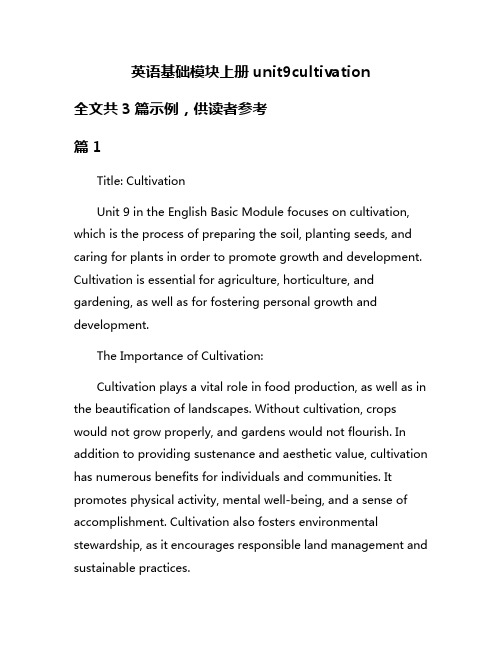
英语基础模块上册unit9cultivation全文共3篇示例,供读者参考篇1Title: CultivationUnit 9 in the English Basic Module focuses on cultivation, which is the process of preparing the soil, planting seeds, and caring for plants in order to promote growth and development. Cultivation is essential for agriculture, horticulture, and gardening, as well as for fostering personal growth and development.The Importance of Cultivation:Cultivation plays a vital role in food production, as well as in the beautification of landscapes. Without cultivation, crops would not grow properly, and gardens would not flourish. In addition to providing sustenance and aesthetic value, cultivation has numerous benefits for individuals and communities. It promotes physical activity, mental well-being, and a sense of accomplishment. Cultivation also fosters environmental stewardship, as it encourages responsible land management and sustainable practices.The Process of Cultivation:The process of cultivation involves several key steps, including preparing the soil, selecting seeds or plants, planting them, watering and feeding them, and protecting them from pests and diseases. Each step is important for ensuring the success of the cultivation process. Proper soil preparation, for example, helps plants establish strong roots, while regular watering and feeding supply them with essential nutrients. Pesticides and fungicides can be used to control pests and diseases that may threaten the health of plants.Cultivating Personal Growth:Cultivation is not only important for plants but also for individuals. Cultivating personal growth involves nurturing one's talents, skills, and potential in order to reach one's full potential. This process requires dedication, patience, and hard work, just like cultivating plants. By setting goals, developing new habits, and seeking out opportunities for growth, individuals can cultivate their personal development and achieve success in various areas of their lives.Cultivation in Education:Cultivation is also a key concept in education, where it refers to the process of nurturing students' intellect, skills, and character. Educators cultivate their students by providing them with the knowledge, resources, and support they need to succeed. By creating a positive learning environment, setting high expectations, and fostering a growth mindset, teachers can cultivate their students' academic and personal growth. Cultivation in education also involves promoting moral values, social skills, and emotional intelligence in students.In conclusion, cultivation is a fundamental process that plays a crucial role in agriculture, horticulture, gardening, and personal development. By understanding the importance of cultivation, mastering the process, and applying it to various aspects of life, individuals can grow and thrive in both their personal and professional endeavors. Cultivation is a journey of growth, transformation, and self-discovery that requires patience, dedication, and resilience. As we cultivate our gardens and ourselves, we become more connected to nature, to others, and to ourselves. Let us embrace the process of cultivation as a pathway to growth, fulfillment, and success.篇2Unit 9 CultivationIn Unit 9 of the English basic module, students will learn about cultivation, which is the process of preparing and tending to the soil in order to grow crops or plants. Cultivation is an essential part of agriculture and is crucial for providing food for the world's population. In this unit, students will learn about different cultivation techniques, tools, and practices.1. Types of Cultivation:- Traditional Cultivation: This method involves manually preparing the soil using tools such as hoes and shovels. Traditional cultivation is labor-intensive but is still widely practiced in many developing countries.- Mechanized Cultivation: This method uses machines such as tractors and plows to prepare the soil. Mechanized cultivation is more efficient and allows for larger areas of land to be cultivated in a shorter amount of time.- Organic Cultivation: This method involves growing crops without the use of synthetic chemicals or pesticides. Organic cultivation is becoming increasingly popular due to its environmental benefits and health benefits for consumers.2. Cultivation Tools:- Plow: A plow is a farming tool used to break up and turn over soil in preparation for planting. There are different types of plows, including the moldboard plow and the disc plow.- Hoe: A hoe is a gardening tool used to remove weeds and cultivate the soil. There are different types of hoes, including the Dutch hoe and the draw hoe.- Tractor: A tractor is a farming vehicle used to pull heavy machinery such as plows and seeders. Tractors are essential for mechanized cultivation.3. Cultivation Practices:- Crop Rotation: Crop rotation is the practice of planting different crops in the same field in succession. This helps to maintain soil fertility and prevent soil erosion.- Mulching: Mulching is the practice of covering the soil with materials such as straw or bark to retain moisture and suppress weeds. Mulching also helps to improve soil structure.- Irrigation: Irrigation is the process of supplying water to crops to ensure proper growth and yield. There are different irrigation methods, including drip irrigation and sprinkler irrigation.In conclusion, cultivation is a fundamental aspect of agriculture and plays a crucial role in feeding the world's population. By learning about different cultivation techniques, tools, and practices in Unit 9, students will gain a deeper understanding of how food is produced and the importance of sustainable farming practices.篇3Unit 9 Cultivation in the Basic English module focuses on various aspects of cultivation, including agriculture, gardening, and the development of skills and knowledge. In this unit, students will learn key vocabulary related to cultivation, practice their listening and speaking skills through discussions androle-plays, and engage in reading and writing activities to deepen their understanding of the topic.One of the key topics covered in this unit is agriculture. Agriculture is the practice of cultivating crops and raising animals for food, fiber, and other products. Students will learn about different types of agriculture, such as subsistence farming, commercial farming, and organic farming. They will also learn about the importance of sustainable agriculture practices in preserving the environment and ensuring food security for future generations.Another important topic covered in this unit is gardening. Gardening is the practice of cultivating plants, such as flowers, fruits, vegetables, and herbs, for aesthetic purposes or for consumption. Students will learn about the tools and techniques used in gardening, as well as the different types of gardens, such as flower gardens, vegetable gardens, and herb gardens. They will also learn about the benefits of gardening, such as physical exercise, stress relief, and connecting with nature.In addition to agriculture and gardening, students will also explore the development of skills and knowledge related to cultivation. This includes learning about the history of agriculture, the science of plant growth, and the role of technology in modern farming practices. Students will also learn about the importance of lifelong learning and continuous improvement in cultivating their skills and knowledge in this field.Overall, Unit 9 Cultivation in the Basic English module is designed to help students develop a deeper understanding of the practices, principles, and benefits of cultivation. By learning about agriculture, gardening, and the development of skills and knowledge in this field, students will be better equipped to engage with the world around them and make informed decisions about their own cultivation practices.。
高中英语Unit9HumanBiologyPeriod2Lesson1课件北师大版选择性必修第三册
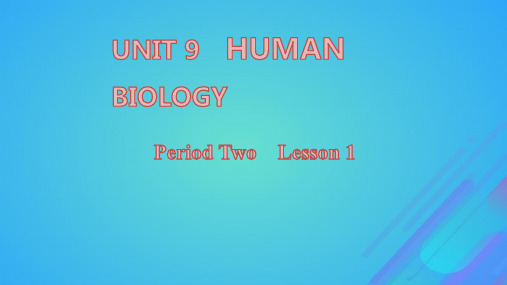
⑧The boy pretended to have known it.
1.以上句子分别使用了不同的________或________形式 来表达“完成”的概念。
2.根据以上例句,表示“完成”动作的形式有: ________时态(句①), ______时态(句②和句③),过去完成进行 时态(句⑥), ______时态(句④), ______的完成式(句⑧),动词ing形式的完成式(句⑤),含有情态动词的完成时态(句⑦)。
灵长类动物的成功克隆获得了全世界的赞誉,被认为是一 项巨大的突破,从而为治愈多种疾病、延缓衰老提供线索。
【答案】3.led to; how to prevent
4.For years, there had been ________ animals artificially. 多年来,人们一直在尝试人工克隆动物。 5.At first, Dolly grew normally, but later she ________ that is more normally found in much older animals. 起初,多莉发育正常,但后来患上了一种疾病,这种疾病 更常见于衰老的动物。 【答案】4.attempts to clone 5.developed an illness
things and discover the differences between them.
ห้องสมุดไป่ตู้
()
5.If you say that something will happen or continue forever,
高中英语Unit9HumanBiologyPeriod6Viewing课件北师大版选择性必修第三册
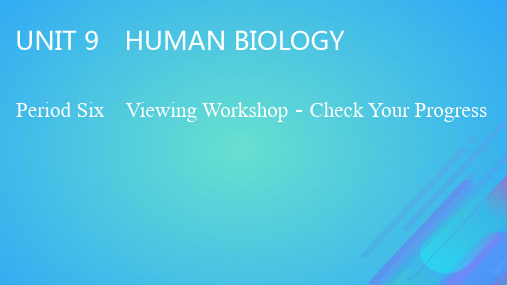
perform an experiment/an operation/a miracle做实验/做手术/ 创造奇迹
It’s extremely cruel to perform an experiment on live animals. 对动物活体进行实验是一件极其残忍的事情。
performance n. 表演;表现 put on/give a performance进行表演 Tom used to be very shy, but this time he was brave enough to give a performance in front of a large audience. 汤姆过去很腼腆,但这次却非常勇敢能在大庭广众面前上 台表演。 performer n. 表演者;执行者
4.perform vt. &vi. 表演;表现;执行 (P65)Qi, a vital energy that flows through the body, performs multiple functions in maintaining health. 【翻译】气是流经身体的一种重要的能量,在维持健康方 面起着多种作用。
(3)He said this would prevent companies from ________ (create) new jobs.
(4)We hope to keep anything unpleasant ________ happening. 【答案】(3)creating (4)from
【语言提升】 prevention n. 阻止;预防 Stores spend more and more on crime prevention every year. 商店每年在防止犯罪方面的花费越来越多。
Ambition研究生综合英语unit 9 PPT

Unit Nine AmbitionI. Introduction of the authorPerri Klass, MD, is a pediatrician and writer, who has published extensively about her medical training and pediatric practice. She is well known for her writing about the issues of women in medicine, about relationships between doctors and patients, and about children and literacy. She is the author of both fiction and nonfiction: novels, stories, essays, and journalism.Dr. Klass is Professor of Journalism and Pediatrics at New York University, and Medical Director of Reach Out and Read, a national childhood literacy program that works through doctors and nurses to encourage parents to read aloud to young children, and to give them the books they need to do it.She is a member of the National Advisory Council of the National Institute of Child Health and Human Development, and has been nominated by the President of the United States to the Advisory Board of the National Institute For Literacy.Baruch de SpinozaBaruch de Spinoza was a Jewish-Dutch philosopher. Revealing considerable scientific aptitude, the br eadth and importance of Spinoza’s work was not fully realized until years after his death. By laying the groundwork for the 18th century and modern biblical criticism, he came to be considered one of the great rationalists of 17th-century philosophy. His magnum opus, the posthumous Ethics, in which he opposed Descartes’s mind–body dualism, has earned him recognition as one of Western philosophy’s most important contributors. In the Ethics, ―Spinoza wrote the last indisputable Latin masterpiece, and one in which the refined conceptions of medieval philosophy are finally turned against the mselves and destroyed entirely.‖Philosopher Georg Wilhelm Friedrich Hegel said of all contemporary philosophers, ―You are either a Spinozi st or not a philosopher at all.‖Jane Goodall is a British primatologist, ethologist, anthropologist, and UN Messenger of Peace. Considered to be the world's foremost expert on chimpanzees, Goodall is best known for her 45-year study of social and familyinteractions of wild chimpanzees in Gombe Stream National Park, Tanzania. She is the founder of the Jane Goodall Institute and has worked extensively on conservation and animal welfare issues.II. The theme of the textDr. Klass discusses he r understanding of ambition and its meaning to one’s life. According to her, ambition is dreaming big dreams with no restrictions on one’s expectations. Ambition may make one frustrated or even one-sided, but it can also drive you to get close to your drea m which deserves to be cherished in one’s life.III. Structure of the textPart I Introduction (Para. 1-3)Main idea: I appreciate ambitious people since they have grandiose dreams and are entertaining and interesting to talk to. I am also an ambitiouspeople and do not feel apologetic about it.Part II Main body (Para. 4-14)∙Main idea: To some people, the word ―ambition‖ often relates with the words ―madness‖ and ―ruthless‖. However, in the late 70s and 80s, ―ambition‖ became desirable. But for me, ambitions are not some specific and attainable goals but big dreams. It is quite important but also difficult for one to live with his or her ambition.Argument 1 (para. 4-7)∙ Observing from a historical perspective, ambition has been a pejorative word. However, the author has her own understanding on this word.Example 1: the word ―ambitious‖ linked to a ―career woman‖ who is ruthless.Example 2: ―ambitious‖ is still a nasty attribute even it is favored by the ones who want to be successful.Argument 2 (para. 8-13)∙ People with or without ambition are tortured by ambition.Example 1: Achievements made by ambitious people will give you a great pressure.Example 2: One has to suffer a long time tough work to enjoy their delayed gratification.Example 3: One’s ambitions may come into conflict so one has to give up some of them.Part III Conclusion (Para 14-15)∙ Main idea: Although people are often over consumed by their ambitions, it is still necessary to cherish their own dreams which can drive you move forward.IV. Words and phrases1. grandiose: impressive because of unnecessary largeness or grandeur1) The sad truth is that not one of Tim's grandiose plans has even begun.2) Today it is the wealthiest enclave in the country, with gaudy, grandiosemansions that cost hundreds of thousands of dollars.如今它是这个国家最富裕的地区,拥有价值数十万美元,华丽而宏伟的高楼大宅。
Unit 9Read and write.1 Fill in
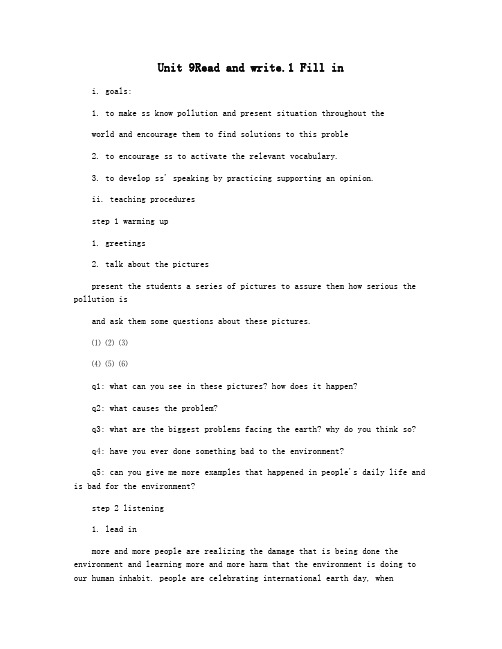
Unit 9Read and write.1 Fill ini. goals:1. to make ss know pollution and present situation throughout theworld and encourage them to find solutions to this proble2. to encourage ss to activate the relevant vocabulary.3. to develop ss' speaking by practicing supporting an opinion.ii. teaching proceduresstep 1 warming up1. greetings2. talk about the picturespresent the students a series of pictures to assure them how serious the pollution isand ask them some questions about these pictures.⑴ ⑵ ⑶⑷ ⑸ ⑹q1: what can you see in these pictures? how does it happen?q2: what causes the problem?q3: what are the biggest problems facing the earth? why do you think so?q4: have you ever done something bad to the environment?q5: can you give me more examples that happened in people's daily life and is bad for the environment?step 2 listening1. lead inmore and more people are realizing the damage that is being done the environment and learning more and more harm that the environment is doing to our human inhabit. people are celebrating international earth day, whenvarieties of activities are held so that more people will be involved in environment protection.2. while-listeninglisten to part 1 and answer the questions.1) why is she giving this speech?2) what does she think the most serious problem is?3) what does she say that we should do about it?4) what do you think she will say next?listen to part 2 and fill in the blanks with what ss hear.argument 1: we should _____________.we must _________________________.we should _______________________.if we _______, we ________________. argument 2; _______________________problem: _______________________solutions: _______________________3. post-listeningpair work: infer what the speaker will say next, list like the above one and share the speech with the partner and the class.group work: discuss with group members about the measures that we may take to protect air, forest; animals; grassland.ask ss to deliver their speech on environment protection.period 2 speakinggoals:1. make the ss learn some useful words and expressions.2. further develop students’ speaking abilities.3. arouse the ss to take better care of the earth.teaching procedures:step 1 revisionwe have known much about pollution around. what are the problems we are facing? which one do you think is the most important? why?group 1: the lack of safe and clean water.more than 1.2 billion people lack access to clean and safe waterproviding safe and clean drinking water would save money by freeing hospital beds from patients with disease caused by dirty water.12 percent of the world’s population uses 85 percent of its water, and these 12percent live in developed countries.group 2: air pollutionair pollution causes more than 2.7 million deaths in the world every year.most air pollution is caused by the burning of fuels like coal, gas and oil.each year tens of thousands of people die as a result of breathingpolluted air.air pollution causes other diseases and may make it easier for children to get sick in the future.group 3: poor sanitationover 2.4 billion people have no access to sanitation.every day, as many as half of all the people on the earth suffer from one of the many diseases caused by poor sanitation.without proper sanitation, efforts to improve health care are useless.group 4: povertyhalf the world lives on less than two dollars a day.1.3 billion peoplelive on less than one dollar a day.in the year , some 1.7 million children died as a result of poverty.almost million people on the world do not have enough to eat.step 2 speaking1. talking about what ss can see in the picture.(1) (2)q1: what is being piled in the picture 1?q2: what can coal be used for?q3: what is being giving off from the workshop?q4: what is being polluted?every coin has two sides. it is true with coal, which is a valuable resource that can be used to produce energy, but it can also cause serious pollution.2. group work: a debate coal is/isn’t a valuable resource.pros consa businessman an environmentalista scientist a local citizena local leader… …1. as we know, coal is a valuable resource to produce energy, but it can also cause serious pollution. we will attend a meeting and discuss the issue.2. four ss get a group. you are citizen, businessman, scientist and environmentalist.citizen: we must burn the coal so that we can get money to develop our area as soon as possible, because…businessman: we should burn the coal because…scientist: we should spend more money on science so that we can use the coal in a better way, because…environmentalist: we shouldn’t burn the coal because…3. as a local leader in this area, summarize and help the speakers decide.4. ask the ss use these useful expressions:we must make sure that… it’s clear that…i believe that we must… i’m all for…if nothing is done…, then… i can’t imagine that…sure/ certainly / absolutely it would be better if we…is there a better way to…?step 3 conclusionwe human beings should take good care of our planet, because it is the only place we can survive. love the earth, love ourselves.period 3-4 reading welcome to the earth summiti. goals:1.to promote the students' understanding of the text2. to get the students to grasp the detailed information of the text3. to enable the students to master some words and expressions4. to improve the students' reading abilityii. teaching proceduresstep 1 warming upask the students some questions connected with pollutionq1: did you use to go swimming in a river when you were young?what about the children today? why not?q2: do you use one-off chopsticks while having fast food?q3: how do you deal with the plastic bags?q4: what do you think of the air today?q5: what do you think of the relationship between economy development andpollution?step 2 pre-reading1. discussionread the title and discuss in pairs what problems will be discussed at the summit.(as the title states, problems related to the earth will be discussed at the summit, like air, water, forest, desert, grassland, etc)2. predictiongroup work: fill in the chart with what ss predict about what each part of the text will be about.introductionbodyconclusion3. problem-solvinggo through the whole passage and compare whose guess is the closest to the content of the passage.4. find the answers to these two questions.q1: when and where was the earth summit held?(in in johannesburg in south africa.)q2: which chinese officer attended the meeting? what did he say?(premier zhu rongji; stressed the need for quality and fairness in the world. )step 3 while-reading1. individual workget the students to read the text carefully and ask some students to answer the following questions in their own words.q1: what was the meeting held in about ?q2: what's the main theme of the earth summit?q3: do you know the 'big three’? what are they?q4: where do you think usually has 'the big three'? why?q5: what does global development mean nowadays? what should developedcountries actually do?q6: what's the use of conferences like the earth summit?q7: what's the key to the future? as a student, what should you do?2. reading for informationwhen inwhere johannesburg, south africatheme sustainable developmenthow to continue developing the world without damaging the environmentbodythe “big three” contaminated drinking water; 20%poor sanitation:air pollution: three million deaths; in rural areas in developing countriesglobal development equality each country takes part infairnessinternational cooperation rich counties help poor countries; prosperity of developing countries; possible sustainable developmentconclusionimpact 1. help to understand the existing serious problems2. there’s still time to ta ke action3. change the way we live to save the earth4. ss are learning “earth issues”5. a place to find solutions for the futurestep 4 post-reading1. retellingsuppose you were the chinese girl who attended the earth summit, tell what she heard and saw at the summit. begin with “hello, everyone. i’m theluckiest girl to attend the earth summit in johannesburg. now let me tell you about the summit. …”2. interviewss work in pairs, playing the role of a newspaper reporter, attendantsfrom different continents attending the earth summit. finally the teacherinvites some pairs to act out their interviewgroup work:task: prepare the coming earth summitarrangement: s1: organizations2: prepare necessities for the summits3: mess medias4: attendants inviteds5: budgets6: transportation & accommodationhave ss present the preparations for the summit in groups.task debateas we know the earth summit is a place to find solutions for the future. some people say that money can solve all problems, but some say knowledge. which one do you agree? money or knowledge? ss will be divided into two groups. see which group can win the debate.step 5 conclusionif we want to get knowledge, we must have better education. with better education, people will be able to build a better society in harmony withnature. with better education, much of the poverty can be wiped out. withbetter education, we will see less violence and fewer wars.step 6 homework1. write a report about the earth summit. (- words)2. make up a poster to arouse people to stop polluting the environment.period 5-6 language study & grammari. goals:1. to get ss to learn and master the usages of the new words and theuseful expressions in this unit.2. to enable ss to grasp the grammar: inversion.ii. teaching procedures:step 1 warming up1. greetings2. play a guessing game: first some items are shown on the screen, andeach item is the paraphrase of one new word. divide the class into four groups. ss are encouraged to guess the word as quickly as possible. this game is to enlarge ss’ vocabulary.(1) to make a place or substance dirty and dangerous by adding sth to it.(2) to make a short statement giving only the main information and not the details of a plan, report etc.(3) the situation or experience of being poor.(4) a position or situation in which people have the same rights, advantages.(5) to do sth in order to protect someone or sth from being attacked(6) to do sth that produces an effect or change in someone or sth(7) .behavior that is intended to hurt other people physically(8).not right or fair(9).sth that you can choose to do or use instead of sth else(contaminate, summarize, poverty, equality, defend, affect;violence, unfair, alternative )complete the following sentences with the words from the bracket, using the correct for1. according to the report, the environment has become a major _______ worldwide.one in five children before age five die from diseases caused by environmentalproblems. ( kill )2. internet use has been spreading at a(n) _________ speed in china. “have you surfed the net?’’ has become a more common greeting than the traditional “ have you eaten?’’ ( alarm )3. the word “netizen”, which means a p erson who uses the internet, comes from “net” and “________”. ( city )4. during the interview, the young man asked about the job ____________ asa sales manager. ( responsible)5. how many chinese ______________ will be sent to the international meeting in stockholm, sweden? ( represent )6. the people who listened to the report were shocked by the ________ of the villagers. ( suffer )7. it was there people’s __________ to work hard and well that impressed me most. ( willing )(killer, alarming, citizen, responsibility, representatives, suffering, willingness )step 2 language points and useful expressions1. attend: 出席,上(大学等),照料to go to an event such as a meetingeg: only 7 people attended the meeting.to go regularly to a school, church etceg: all children between the ages of 5 and 16 must attend school.to look after someone, especially because they are illeg: the nurse attended the patient daily.attend to sb/sth 处理,照应eg: i may be late �c i have got one or two things to attend to.are you being attended to in a shop?then do some exercises to enable ss to distinguish the following words: attend / join / join in / take part in / join sb in sthex: fill in the blanks with the expressions given.1. he’ll _________ an important meeting tomorrow.2. almost all the teams in our school __________ the basketball match.3. my wish is to ________ the army after graduation.4. we’ll _______________ social activitie s during the summer vacation.5. they didn’t ___________ the wedding.6. i ________ the party last year.7. our headmaster will _______ us ____ the discussion this afternoon. (attend, join in, join, take part in, attend, joined, join in )2. take notes: 作笔记,记录take action: 采取行动eg: do you takes notes of the lectures?he sat quietly in the corner taking notes carefully.they took action to stop hithe police took action to deal with this thing immediately.the medicine will not take action for several hours.已经开始起至促进作用,起效,生效the pill takes effect as soon as you swallow it.take turnstake measures/stepstake placetake caretake medicinetake timetake coldtake noticetake sideseg: you always takes sides with him without even listening to me.3. content:1). n. 内容,目录 (常作 ~ s ) ; 容量,容积eg: the contents of a booka table of contentslook up the contents at the beginning of the book.a bucket of more than usual content2). adj. 满足用户的,令人满意的be content to do sthbe content with sthcontent oneself with sthhe is quite content to watch tv for hours.i’m very content with my life at present.as there’s no butter we must content ourselves with dry bread. access: 进入,接近eg: the dead-end street was the only access to her home.access to the mountain-town is often difficult because of the bad roads.have access to :eg: twenty percent of the people on earth do not have access to clean drinking water.have sth that you can useeg: the public don’t have access to the site.not until we know more will we be able to improve the situation.until 的三种句式i didn’t go to bed until my mother came back. (陈述句) vnot until my mother came back did i go to bed. (倒装句)it was not until my mother came back that i went to bed. (特别强调句)直至她母亲把一切对杰克和盘托出,杰克才明白她为什么跟自己生气。
北师大版高中英语选择性必修三Unit9Lesson1To Clone or not to Clone
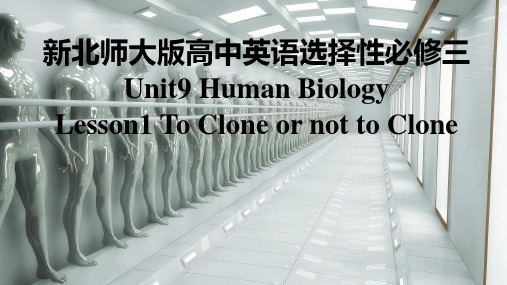
Intensive Reading
1. What was the first cloned mammal? What happened to her?
It was a sheep named Dolly in 1996.
At first, Dolly grew normally. But later she developed an illness that is more normally found in much older animals. She lived for six and a half years, only half the life of the sheep from which she was cloned.
Summary
Complete the summary using the information in the article.
Natural cloning has taken place for generations. An example of this is identical 1 __tw__in_s___. A sheep called Dolly was the first mammal to be cloned 2 _a_r_t_if_i_c_ia_l_ly_. Since Dolly, more than 20 mammal 3 __sp_e_c_i_e_s___ have been cloned including camels and goats. In 2018, China announced that two monkeys had been cloned.
Intensive Reading 2. How has the science of cloning developed since the first cloned mammal?
高中英语Unit9Period4Lesson3课件北师大版选择性必修第三册
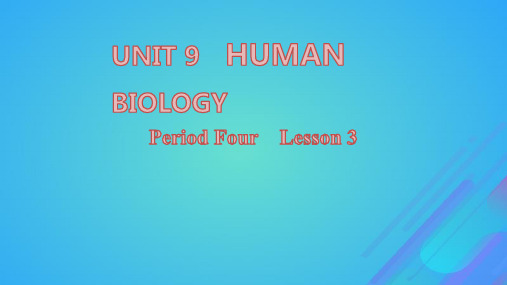
( )4.Which of the following epidemics is believed to have been the most severe in history?
A.The SARS. B.The Ebola Virus Disease. C.The bird flu. D.The Spanish Flu. 【答案】D
(3)________(variety) of goods for daily use are available in this department store.
(4)A ________(vary) of a gene can influence people’s social behavior.
4.actual adj. 实际的;真实的→________ adv. 实际上;事实上 (参考:desperate→desperately) 5.out+break→________ n. 爆发;突然发生 (参考:over+come→overcome) 【答案】4.actually 5.outbreak
现今科学家估计,发病区域多达50%的人口死于这一流行 病,成为罗马帝国衰落的一个主要原因。
【答案】3.up to 50% of the area’s population
4.With recent press reports drawing parallels between bird flu and killer epidemic of the past, Jim Smith looks at the sometimes depressing history of epidemic for clues about ________ ______ without epidemics.
Unit9End-of-lifecare临终关怀——《21世纪研究生英语教材阅读教程》下册.doc
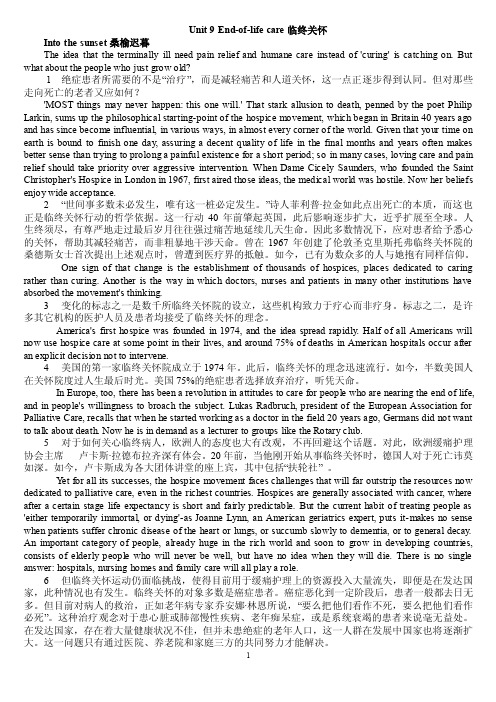
Unit 9 End-of-life care临终关怀Into the sunset桑榆迟暮The idea that the terminally ill need pain relief and humane care instead of 'curing' is catching on. But what about the people who just grow old?1 绝症患者所需要的不是“治疗”,而是减轻痛苦和人道关怀,这一点正逐步得到认同。
但对那些走向死亡的老者又应如何?'MOST things may never happen: this one will.' That stark allusion to death, penned by the poet Philip Larkin, sums up the philosophical starting-point of the hospice movement, which began in Britain 40 years ago and has since become influential, in various ways, in almost every corner of the world. Given that your time on earth is bound to finish one day, assuring a decent quality of life in the final months and years often makes better sense than trying to prolong a painful existence for a short period; so in many cases, loving care and pain relief should take priority over aggressive intervention. When Dame Cicely Saunders, who founded the Saint Christopher's Hospice in London in 1967, first aired those ideas, the medical world was hostile. Now her beliefs enjoy wide acceptance.2 “世间事多数未必发生,唯有这一桩必定发生。
世纪应用英语听力基础篇2答案unit9
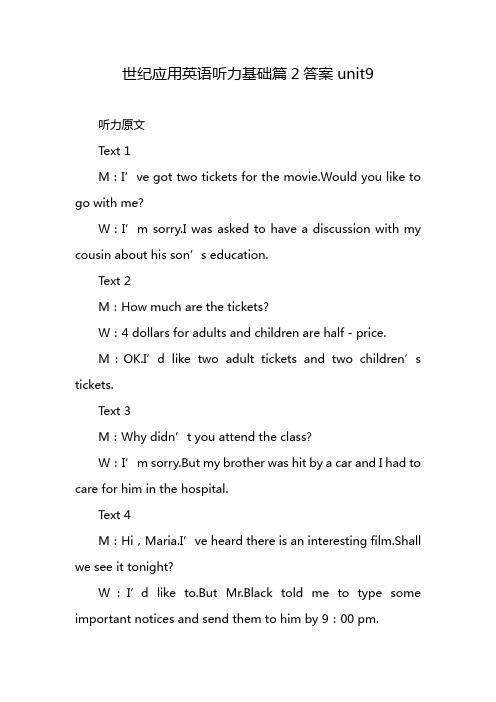
世纪应用英语听力基础篇2答案unit9听力原文Text 1M:I’ve got two tickets for the movie.Would you like to go with me?W:I’m sorry.I was asked to have a discussion with my cousin about his son’s education.Text 2M:How much are the tickets?W:4 dollars for adults and children are half-price.M:OK.I’d like two adult tickets and two children’s tickets.Text 3M:Why didn’t you attend the class?W:I’m sorry.But my brother was hit by a car and I had to care for him in the hospital.Text 4M:Hi,Maria.I’ve heard there is an i nteresting film.Shall we see it tonight?W:I’d like to.But Mr.Black told me to type some important notices and send them to him by 9:00 pm.M:The job is the most important.Text 5W:Manhattan Square,please.M:All right,madam.When are we supposed to be there?W:I’d like to go around the city,if you don’t mind.Text 6M: Hello! This is City Police Station.W:I need help.My house has been broken into.M:Can you tell me some details?W:When I came home,I found my door broken,and my money,my jewelry,and my camera were gone.M:Was there anybody home?W:No.My son,husband,and I all happened to be out having our dinner after work.M:What is your address?W:No.13,Downing Street.Could you come over at once?M:OK.Don’t worry,madam.We’ll be there in 10 minutes.Text 7M:Hi.What can I do for you?W:I’m hunting for a part-time job.M:Then,you’ve come to the right place.Our office isaimed at helping those like you to find jobs.W:Glad to hear that.I really need to earn some money for my education.M:How many hours would you like to work?W:Ten to twenty hours a week.M:And when are you free to work?W:Every weekday since noon.And I wouldn’t mind working on weekends.M:Great.Now please fill out this form.W:When can I get to work?M:I will call you tomorrow.W:Thank you.Text 8M:This is Henry.I’d like to make sure when we can expect you for a get-together.W:Er...What party is it?M:Our former classmates are planning a get-together.W:Oh,that’s good.M:Are you free these days?W:A little busy somehow.M:Can you come this Saturday evening?W:I’m very sorry,I’ve promised to go to the movieswith my daughter.M:Well,how about Sunday then?W:That sounds fine.M:Good.Shall we make it at a quarter to seven?W:I’m sure to be there.Shall we have a dance after that?M:It’s up to you.I’ve learned a new dance these days.Then we can share it.W:That’s great.Text 9W:I’ll take part in a very important party for my friend Amy.M:Really?W:Amy has just been awarded the first prize for her English speech.M:Great.W:Today is her 26th birthday.M:Then you must buy a gift for her.W:What do you think I should buy for her?M:A birthday cake.W:No,she has got one from her boy friend.M:Then,what else?W:I think an MP3 player will be OK.M:Hasn’t she had one already?W:But it is broken.She li kes music.I think it’s the best for her.M:You’re right.Then shall I drive you there?W:No.I’ll do it myself.You have to care for my pet dogs and cats.Text 10Hello,everyone.Welcome to our hospital.Now I’m going to tell you something about my hospital,Friendship Hospital.It looks very new and modern.But it has a history going back to three quarters of a century.It was designed to sleep 200 patients,and then 400.With the development of the new building blocks,it can now sleep 900 patients.It started its life as a general hospital.But now it has developed its new departments and become the teaching hospital that is famous all over the area.It has created new fields for treating heart diseases and eye diseases with a lot of experienced and famous doctors.During the teaching process,it includes a school of baby nursing.In 2001,the President along with the mayor visited the children from flooded areas,and on Christmas Day last year,the Prime Minister had lunch with the patients,talking about their life after the AIDS disease.一、听力(共两节,满分30分)第一节(共5小题;每小题1.5分,满分7.5分)听下面5段对话。
课文听力文本unit9aboutyourself

Unit 9 About YourselfPartⅠ Getting ReadyExercise B.Keys:1. teeth, 24, 322. bones, 153,2063. heart, 98, 7.4. nose (meaning: not interfere in)5. foot (meaning: cause embarrassment by doing or saying sth. tactless)6. hand, hand(meaning: ask for help)7. ears (meaning: listen with care)8. Head (meaning: completely)9. neck (meaning: deeply involved in)10. heart, heart (meaning: with the deepest devotion)Tapescript:1. A: Do you know how many teeth you’ve gotB: How many teeth Ooh, ooh, 24 More (Yes) 32A: Yes.2. A: Do you know how many bones there are in your bodyB: How many bones I'll take a guess. 153.A: 206.3. A: How often does your heart beat?B: 98 times a minute.A: No, 70 times a minute.4. Bob: Do you know what the boss thinks you should do, Billy?Billy: Just you keep your great nose out of this, Bob, will you (Meaning: not interfere in)5. Anne: Steven Kent, I never, never want to see you in my life again.Steven: Oh no.Mary: You really have put your foot in it, haven't you(Meaning: cause embarrassment by doing or saying sth. tactless)6. Kate: Dave! Can you give me a hand, pleaseDave: What?Kate: I said can you give me a hand.Dave: All right, I'm coming. No need to shout. (Meaning: ask for help)7. Max: Are there any jobs going in your company then, for an intelligent, hard-working young man; like my son Julian?Frank: No, I haven't heard of any at all recently.Max: Well, could you keep your ears open, just in case (Meaning: listen with care)8. Carol: Have you heard about Maggie then?Norma: Maggie Maggie ThatcherCarol: No. Maggie Brown. She's in love again.Norma: Oh not again. Who with this timeCarol: With her boss. Head over heels in love with him, she is. (Meaning: completely)9. Nick: Have you ever lent any money to Mick?Jill: Mick Huh! I wouldn't lend him any if I were you.Nick: Why not Doesn't he pay it back?Jill: No. Never. He's up to his neck in debts. (Meaning: deeply involved in) 10. Liz: She's a very good doctor. Never looks at her watch. Never complains. Nothing's too much trouble for her.Pat: I know, yeah. Not many like her about. She's all heart, really. All heart.(Meaning: with the deepest devotion)PartⅡExercise A.Keys:4 35 2 4 1 3 4 4 1Tapescript:Our body is made up of thousands of different parts. All these parts work together to keep us alive and to help us move around. The parts of the human body are like the parts of a very complicated machine. Like any other machine, however, if it is inexpertly cared for, over-taxed or insufficiently used, it will become rusty, sluggish or clogged and parts of its mechanism may even grind to a halt. That is why it is so important to keep every part of the human machine healthy and properly cared. To keep in good running order, the body requires the raw materials for growth and the replacement of tissues when necessary. Our bodies bum food like fuel to produce the energy we need.The human digestive system is a bit like a very long tube, but it's a lot more complex. It's several meters long, and most of it is carefully coiled up in our abdomen. It has several important jobs to do.First, it must digest or break down our food. Digestion starts the moment food enters our mouth. Then it continues as the food is squeezed along the gut by muscles in the wall of the intestine. As the food travels through the gut, natural chemicals called enzymes are added to it, which help break down the food. Then this digested food and water must be absorbed from the gut into our blood stream so that it can be used by the body. Finally, the gut must carry away any waste products in the form of feces.Usually our intestine does all these things very efficiently. But sometimes things can go wrong. Probably the most common gut symptoms are diarrhea and constipation.With diarrhea, the food and water travels too quickly through the intestine, often making the feces watery, and making it necessary to open the bowels more frequently.There are lots of causes of diarrhea. Probably the commonest causes of diarrhea are contaminated food or water, and infection caused by viruses or parasites.Many cases of diarrhea clear up within a few days without any special medicines. But the body loses a lot of fluid through diarrhea, so there is a very real risk of the body drying out or becoming dehydrated. Because of this risk of dehydration, the best treatment for diarrhea is simply to make sure you are dinking enough. Avoiding dehydration in this way can be a life saver.Exercise B.Keys:Causes of diarrhea:food poisoning, themselves, the gut,get very nervous, stressed about something diarrheaTreatment of diarrhea:serious, clear up, one or two days, drink lots of fluid, eat too much, salt and sugar, specially mixed, sugar and a pinch of saltTapescript:There are lots of different causes of diarrhea. Um, there are infections that can happen, and this is food poisoning, if you like, where in your food you eat some sort of bacteria or organisms, which infect you. Some foods can just irritate thegut and tend to give you diarrhea, although they are not infected. It's just the food itself (that) might irritate your system. Some people, if they get very nervous and stressed about something, find they tend to get diarrhea. Something called the irritable bowel syndrome where something goes wrong with the way the gut works. And people that suffer from this tend to get, um, tummy pains, and they get sometimes diarrhea, sometimes constipation. All sorts of causes.Most attacks of diarrhea, urn, particularly in adults, are not serious and they clear up by themselves within one or two days. The most important thing is to drink lots of fluid, because if you have got diarrhea, you're obviously losing a lot of fluid. And so it's better really not to eat too much, not to worry about that, but o make sure you drink plenty of fluid. And ideally, this should have a little bit of salt and sugar in. You can get special dehydrating fluids, which are specially mixed. But if you want to make your own by adding just a teaspoonful of sugar and a pinch of salt, then it's obviously perfectly reasonable to do that.Part Ⅲ ImmunityExercise B.Keys:1. Because there are some things which we’re not naturally immune to.2. A version of an illness is given to the body, and the body thinks that it’s actually being infected with that infection. The next time it sees it, the body can respond very quickly.3. No. We can’t produce a vaccine for AIDS, for instance.4. The HIV virus, which causes AIDS, attacks the human immune system. And the virus itself can change very easily. It’s very difficult to find a vaccine which can recognize all types of HIV.Tapescript:The human body is constantly under attack from invading germs and infections. And the only reason we don't suffer from constant illness is our bodies have their own defense mechanism to fight off disease. This resistance to infection is called immunity.A: How does immunity workB: Well, the immune system is the body's own secret army, which fights infection.And it consists of a whole range of troops, soldiers, their cells and their molecules. Now the headquarters of this army is really the blood. That's where it does most of its fighting. And sometimes it needs some reserve, and that comes from the bone marrow. That's where the immune cells are made.A: So there are many different kinds of cells, different kinds of molecules in the immune system. I guessed the ones that we're probably more familiar with are white blood cells.B: That's right. White blood cells form a major part of the body's defense. But there are also antibodies in their life, more proteins. They just lash onto the invaders.The white cells can sometimes actually gobble up invaders. The clever thing is that once the infection has attacked our body, the immune system seems to havea memory of the invader, so that the next time it sees the invader it can attackvery quickly.A: There are some things which we're not naturally immune to and that's where vaccination comes in, isn't itB: Exactly. Vaccination plays on the body's ability to remember infection. So what happens is that someone is given a version of an illness, for instance, measles or polio, or tuberculosis, and the body thinks that it is actually being infected with that infection. And the next time it sees it, the body can respond very quickly. All the troops of its immune system can come into play.A: Now sometimes the immune system doesn't work very well, does itB: No. It's a remarkably complex system. And sometimes it can go wrong. Either it can be overactive, so it actually starts to attack our own body self, or it can be underachieve sometimes, and we are more likely to be infected in that situation.A: Are there any important illnesses, which result from the immune system so that it's turning on our bodies themselvesB: There are. One example would be a disease like multiple-sclerosis, where the body's own immune system attacks the lining of nerves, which means that people's nerves don't work properly.A: We're able to assist the body in its fight against the illness in many cases, but there are some diseases which we don't seem to be able to produce a vaccine for. AIDS is one of them. Why notB: The problem is AIDS, which is caused by the HIV virus, attacks the human immune system, which means that our normal defenses aren't there to fight off that infection. The other problem with trying to produce a vaccine against HIV or AIDS is that the virus, HIV, can change itself so easily. That's very difficult to find a vaccine, which can recognize all the different types of HIV. So one vaccine may be effective against one type of the virus but it may absolutely be no good for another type.Exercise C.Keys:headquarters → bloodGobbling up invadersHaving a memory of invadersUnderactive — more likely to be infectedthe immune system: 2 3vaccination: 5HIV: 1 4 6Tapescript:Presenter: The human body is constantly under attack from invading germs and infections. And the only reason we don't suffer from constant illness isour bodies have their own defense mechanism to fight off disease. Thisresistance to infection is called immunity. And here with me to discusshow it works is Grime Easton. He is a family doctor, and a member of theScience In It here in the BBC World Service. Grime, how does immunity work Grime: Well, the immune system is the body's own secret army, if you like, which fights infection. And it consists of a whole range of troops, soldiers, their cells and their molecules. Um, now the headquarters of this army is really the blood. That's where it does most of the fighting. And sometimes it needs some reserve, some backup, and that comes from the bone marrow. That's where the immune cells' factories are,Presenter: So there are many different kinds of cells, and different kinds of molecules tied up in the immune system. I guessed the ones that we'reprobably more familiar with are white blood cells.Grime: That's right. White blood cells form a major part of the body's defense. But there are also antibodies in their life, more proteins, which just lash onto the invaders. Um, but, as you say, the white cells can sometimes actually gobble up invaders. So the clever thing is that once the infection has attacked our body, the immune system seems to have a memory of the invader, so that the next time it sees the invader it can attack very quickly. The immune system in the human body fights invading disease. Immunity occurs because the immune system can remember the chemical makeup of invading germs and attack themvery quickly.Presenter: There are some things which we're not naturally immune to and that's where vaccination comes in, isn't itGrime: Exactly. Vaccination plays on the body's ability to remember infection. So what happens is that someone is given a version of an illness, for instance, measles or polio, or tuberculosis, and the body thinks that it is actually being infected with that infection. And the next time it sees it, urn, the body can respond very quickly. And all the troops of its immune system can come into play.Vaccination can be used to protect the body against specific infections. Presenter: Now sometimes the immune system doesn't work very well, does it Grime: No. It's a remarkably complex system. It's a very complicated system. And sometimes it can go wrong. Either it can be overactive, so it actually starts to attack our own body self, or it can be under active sometimes, and we are more likely to be infected in that situation.Presenter: Are there any important illnesses, which result from the immune system so that it's turning on our bodies themselvesGrime: There are. And one example would be a disease like multiple-sclerosis, where the body's own immune system, we think, attacks the lining of nerves, which means that people's nerves don't work properly.Presenter: We're able to assist the body in its fight against the illness in many cases, but there are some diseases which we don't seem to be able to producea vaccine for. Um, AIDS is one of them. Why notGrime: Well, the problem is AIDS, which is caused by the HIV virus, is that HIV itself attacks the human immune system, which means that our normal defenses aren't there to fight off that infection, or indeed many other sorts of infection.The other problem with trying to produce a vaccine against HIV or AIDS isthat the virus, HIV, can change itself so easily. Urn, that's very difficult to find a vaccine which can recognize all the different types of HIV, which there are. So one vaccine may be effective against one type of the virus but it may absolutely be no good for another type.HIV is the virus that causes AIDS. HIV destroys the body's immune system, and puts the body at greater risk from other common infections.Presenter: I was talking to Dr. Grime Easton of the Science In It about immunity.The reason why he, I, and I hope you, are able to remain as healthy as we are.Part Ⅳ The Circulatory SystemKeys:parts, waste, body, needed, heart, defense, cells, invaderstwo, lungs, blood, back, arterieswalls, cell, heart, oxygen, blood, digestive, liver, heartPartⅤHairKeys:Caller’s name: Jim BaillieProblem: losing hairCaller’s doctor’s opinion: nothing he can do about it; hereditarySolution: not a lot he can do about it; try to acceptAdvice: don’t comb it over; don’t wear any false hairpiece thingsTapescript:Radio presenter: All right. Thank you for that call, Rosemary. We now go, I think, to Glasgow and our next caller, er, Jim Bail lie. Hello Jim.Jim: HelloRadio presenter: Hello Jim. What's your problemJim: Er ... well I'm er ... beginning to lose my hair. Er, I went to the doctor, but he just said there was nothing I can do about it. He said it was probably hereditary. My father was bald by the time he was thirty.Maurice: Hello, Jim. And how old are youJim: Me. I'm twenty-eight.Maurice: And are you losing a lot of hair, thenJim: Well, it comes out a lot when I comb my hair and you can see a thin part on the top of my head.Maurice: And does that really worry you, JimJim: Well. I don't like it. It's old ... you know ... looks old ... I don't want to look like a middle-aged man at twenty-eight. And I wondered if there was some special shampoo I should use ... if you could tell me one that I should buy ...something like that ... you know ... to stop it getting worse.Maurice: Well, you know, Jim, to be honest with you there's not really a lot you can do about it, actually, I'm afraid. I mean, baldness is one of those things that, in my experience, you just have to try to accept. Some men find it more difficult to accept baldness than others ...Tessa: There is one piece of advice, though, Jim, and that's don't try to comb your hair over the bald or thin patch. Don't try to hide it. Whatever you do, don't comb it over because that usually looks ridiculous. And the other thing that usually looks ridiculous g a man with a wig. Don't let anyone persuade you to buy one of those false hairpiece things, because they usually look much worse than a bald man. I actually think bald men can look very attractive.My husband's bald and I think it really suits him.。
Unit9 Health care

Who discovered Penicillin ?
Alexander Fleming discovered penicillin.
Do you want to know
how Fleming discovered it?
THE LITTLE MOULD TBiblioteka AT COULDPara.4
Fleming was excited about his discovery but other scientists showed no interest. Para.5 Penicillin played a very important role during World War Ⅱand at present as well. Para.3 Fleming discovered a mould that can kill bacteria by accident. Para.1 Health care in the past was often dangerous and risky. Para.2 Fleming invented many ways to treat the wounded during World WarⅠ.
1.治疗疾病 3.死于感染 2.造成感染 4.导致他有新发现
5.有更大意义的发现
7.同疾病作斗争 9.和…一起
6.清理实验室
8.获得诺贝尔奖 10.询问某人…
2. Discuss what you can learn from Alexander Fleming.
True or false 4. Although other scientists showed no interest in his discovery, Fleming continued his research work. T 5. In 1945, Fleming won the Nobel Prize alone. F
_Unit 9 Lesson 1 课件 北师大版(2019)高中英语选择性必修第三册
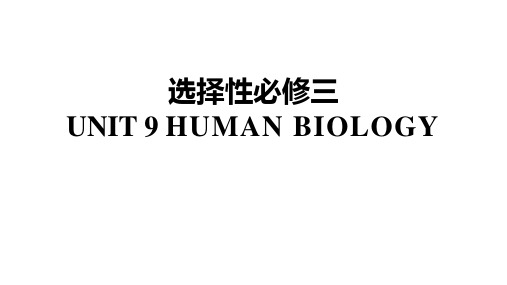
Paragraph 2: Topics
artificial cloning: cloned mammals For years, there had been attempts to clone animals artificially. The first successfully cloned animal was a sheep named Dolly in 1996. At first, Dolly grew normally, but later she developed an illness... After Dolly, scientists have cloned more than 20 mammal species, including... However, they have found a similar pattern of health problems…
Paragraph 3: Topics artificial cloning: cloned primates
In January 2018, the cloning of two long tailed monkeys, Zhong Zhong and Hua Hua, was announced by Chinese scientists. They were the first-ever primates… to have been cloned! In comparison with other species, cloning primates has proved to be “much harder”… Dr. Sun Qiang, director of the research team, said they had been wholly devoted to the research… The reason they worked so hard to break this technical barrier was…
高中英语Unit9Period1TopicTalk课件北师大版选择性必修第三册
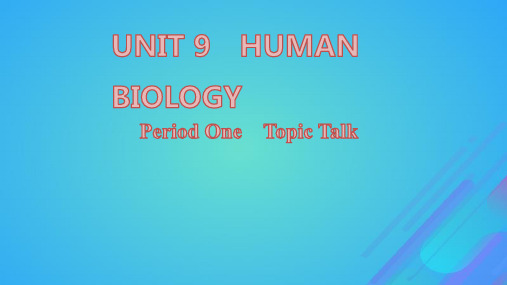
capable adj. 有能力的,能干的 be capable of doing sth. 有能力做某事 The lecture hall is capable of holding two thousand people. 这个报告厅能容纳两千人。 incapable adj. 无能力的
【针对练习】 单句语法填空 (1)Her husband was such a fine, ________(capability) man. (2)They have the capability ________(destroy) the enemy in days rather than weeks. 【答案】(1)capable (2)to destroy
【rticipate in参加 They expected him to participate in the ceremony. 他们希望他参加典礼。 participation n. 参加;参与
【语境助记】 Lots of participants have participated in this activity. Their participation made the activity more meaningful and interesting. 许多参与者参加了这个活动。他们的参与使活动更有意义 和有趣。
完成句子 (3)The factory ___________ our complaints by improving the working conditions. 工厂对我们的投诉的反应是改善了工作条件。 【答案】(3)reacted/responded to
5.participant n. 参加者,参与者 (P109)When the participants started to feel tired, they stopped doing the exercises properly. 【翻译】当参与者开始感到疲倦时,他们就会适当地停止 锻炼。
unit 9 medical education医学英语
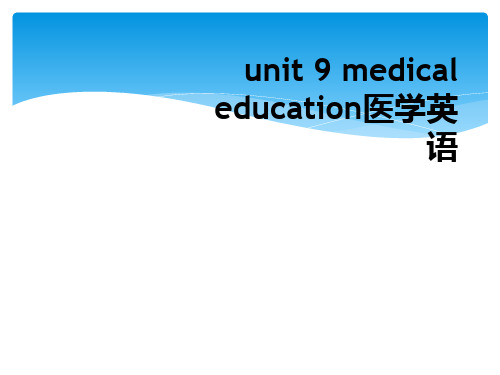
with medical students in Canada. I am curious how a sophomore at UO has his own major (pediatric)?
内科 medicine, internal medicine 内科医生 internist / physician /medical doctor 外科 surgery / surgical department 外科医生 surgeon
What do medical doctors call themselves? (different specialties)
Stereotyping (定型思维)
good school, good doctor; bad school, bad doctor
You comments?
Ranking of medical schools
How are medical schools ranked in the US?
Email No. 2
Hello Ye, Ma Ye)
Sorry, it has been a bad week. Anyway
The medical system in the US has some variability to it. Generally speaking however, after you graduate high school you go to college for 4 years. You can major in many subjects such as Biology, Chemistry or even Math. There is no such thing as a Premedicine major for the most part. This gives doctors a more general education here. After college you would go on to apply and attend medical school. You only major in Medicine and there is no specialization in Medical School.
Unit 9研究生英语读与写(第三版)-
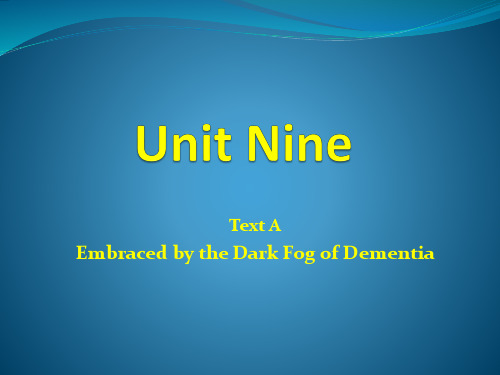
Embraced by the Dark Fog of Dementia
Outline
Background information Global analysis of the text Detailed study of the text Text structure analysis Reference answers to the exercises
No Aggression: First thing that care givers need to learn and understand is that whatever the dementia patients do, they are not doing it on purpose. Reacting with anger or aggression can only result in more violent behavior of patients in future.
Background information
Introduction to the author
Doug Irving is a communications analyst at the RAND Corporation and the lead writer for RAND’s flagship magazine, RAND Review. Prior to joining RAND in 2014, he spent more than 15 years in daily journalism, most recently as the crime and breaking news editor at the Orange County Register. As a reporter, he covered beats ranging from city and county government to transportation to politics and investigations. At RAND, he condenses research reports into reader-friendly magazine articles illustrated with real-world examples.
Unit 9 Human Biology-Writing Workshop(教学课件)-高中英语

Get Ready for Writing
How to write a summary?
What is a summary? A summary is a short overview of the main points of an article or other source, written entirely in your own words.
Professor Jim Smith conducted a study to compare the bird flu epidemic which occurred in 1997 with other deadly epidemics in our history. He found that the earliest took place as early as 500 to 550 CE, which killed half of the population in that particular area. The same epidemic, called “The Black Death”returned in the 1330s in Asia and spread quickly to Europe. Some hundred years later, the Great Flu epidemic broke out in 1918, also known as the Spanish Flu, killing 50 million people. This was considered the most serve epidemic in human history. The 1997 bird flu which claimed over 100 lives was an adaptation of the Great Flu of 1918.
初中英语人教版 八年级下册 Unit 9试卷 含答案
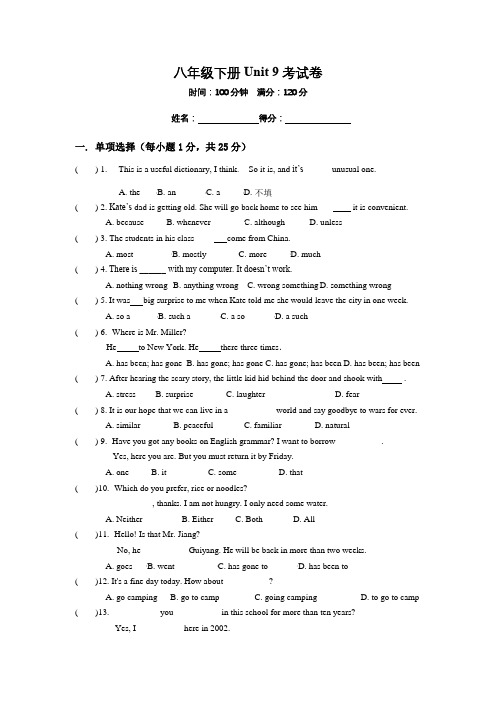
八年级下册Unit 9考试卷时间:100分钟满分:120分姓名:得分:一. 单项选择(每小题1分,共25分)( ) 1. -This is a useful dictionary, I think. -So it is, and it’s ______unusual one.A. theB. anC. aD. 不填( ) 2. Kate’s dad is getting old. She will go back home to see him ___ it is convenient.A. becauseB. wheneverC. althoughD. unless( ) 3. The students in his class ____ come from China.A. mostB. mostlyC. moreD. much( ) 4.There is ______ with my computer. It doesn’t work.A. nothing wrongB. anything wrongC. wrong somethingD. something wrong ( ) 5.It was big surprise to me when Kate told me she would leave the city in one week.A. so aB. such aC. a soD. a such( ) 6. -Where is Mr. Miller?-He to New York. He there three times.A. has been; has goneB. has gone; has goneC. has gone; has beenD. has been; has been ( ) 7. After hearing the scary story, the little kid hid behind the door and shook with .A. stressB. surpriseC. laughterD. fear( ) 8. It is our hope that we can live in a __________ world and say goodbye to wars for ever.A. similarB. peacefulC. familiarD. natural( ) 9. -Have you got any books on English grammar? I want to borrow __________.-Yes, here you are. But you must return it by Friday.A. oneB. itC. someD. that( )10. -Which do you prefer, rice or noodles?-_________, thanks. I am not hungry. I only need some water.A. NeitherB. EitherC. BothD. All( )11. -Hello! Is that Mr. Jiang?-No, he __________ Guiyang. He will be back in more than two weeks.A. goesB. wentC. has gone toD. has been to( )12. It's a fine day today. How about __________?A. go campingB. go to campC. going campingD. to go to camp ( )13. -__________ you __________ in this school for more than ten years?- Yes, I __________ here in 2002.A. Did; come, cameB. Have; been; cameC. Did; come; have beenD. Have; come; came( )14. ___________of our classmates are good at basketball.A. Three quartersB. Three fourthC. Third fourD. Third fourth( ) 15. After the Asian Games, _______people came to Guangzhou for a visit during holidays.A. thousandB. thousandsC. thousand ofD. thousands of( ) 16. The mountain I visited last Sunday isn't very ______. Few ______ go sightseeing there.A. tourist, touristsB. touristy, touristC. touristy; touristsD. tourist; tourist ( )17.Do you know which country has a ___________ population, Japan or India?A. fewerB. largerC. moreD. less( )18. Your father is sleeping. You'd better not ___________.A. to wake him upB. wake up himC. wake him upD. to wake up him( )19. It will be hard for us to get up in the morning if we ___________ to bed too late.A. goB. wentC. will goD. have gone( )20. Everybody should remember it is not _____ to swim in the river alone.A. healthyB. safeC. possibleD. comfortable( ) 21. When my mother came back home last night, I was still _________.A. wakeB. wokeC. wakingD. awake( ) 22. The song I Believe I Can Fly tells us that believing in_________ is very important.A. themselvesB. itselfC. ourselvesD. yourselves( ) 23. He promised to pick me up at the school gate. However , he ________ yet.A. didn't arriveB. doesn't arriveC. isn't arrivingD. hasn't arrived ( ) 24. -Have you ________ to Paris? -Yes, I ________ there last month.A. gone, wentB. went, goneC. been, goD. been, went( ) 25.Do you know ___________ Zunyi or not tomorrow?A. whether are they leaving forB. whether they are leaving forC. if they are leaving forD. if are they leaving for二. 完形填空(每小题1分, 共10分)Have you ever been to an amusement park? There is an amusement park in the center of my city. I think it is wonderful and exciting.I visited the amusement park with my parents this summer. I 26 it was a sunny day. A long line of people were waiting to buy tickets. Most people brought 27 with them: they wanted to take some photos. Inside of the amusement park were many wonderful rides 28 water rides, a roller coaster (过山车) and sightseeing trains. My parents 29 sightseeing trains that carried passengers around the amusement park. 30 felt very relaxed. I liked water rides. You can't imagine how excited you feel 31 you travel through the water. The roller coaster was very 32 with adults and kids. A lot of people were waiting to get on. But some of them 33 stand up after getting off the roller coaster!We had a 34 day and I would love to visit the amusement park again. It was a perfect 35 to spend your day with your family.( ) 26. A. remember B. consider C. imagine D. believe( ) 27. A. tickets B. cameras C. foods D. pictures( ) 28. A. instead of B. according to C. as well as D. such as( ) 29. A. fixed B. liked C. invented D. collected( ) 30. A. He B. He C. They D. We( ) 31. A. if B. though C. unless D. because( ) 32. A. rapid B. popular C. dangerous D. strange( ) 33. A. shouldn't B. needn't C. mustn't D. couldn't( ) 34. A. fun B. terrible C. hard D. quiet( ) 35. A. story B. time C. fact D. place三. 阅读理解(每小题2分, 共20分)( A )根据短文内容,判断下列各句正、误。
- 1、下载文档前请自行甄别文档内容的完整性,平台不提供额外的编辑、内容补充、找答案等附加服务。
- 2、"仅部分预览"的文档,不可在线预览部分如存在完整性等问题,可反馈申请退款(可完整预览的文档不适用该条件!)。
- 3、如文档侵犯您的权益,请联系客服反馈,我们会尽快为您处理(人工客服工作时间:9:00-18:30)。
Reading
Health Care and Epidemics
卫生保健与流行病
Fast reading: Fill the right order before the main idea of each paragraph.
(3 ) People are very afraid of epidemics. (2 ) Epidemics affect deeply.
Drivers refuse to drive them
Headaches Running noses
A fever I have the flu. pregnant women , people over 65,patients.
Part2(2-4):Three kinds of epidemics: (Black Death, plague, flu )
3. The plague destroyed once-prosperous cities, left villages vacant, and caused great disasters.(T)
4. People in power have been known to be cruel to victims of diseases.(T) 5. All flu patients have a high body temperature, called a fever.(F)
(4 ) Flu is a non-fatal disease. (1 ) Outbreaks of infectious diseases are epidemics.
(5 )Medicine relieves flu symptoms. (7 )Government should provide preventive health care.
Epidemics
Reshape , affect , change. Black death
The most widely known
Destroy, leave ,cause.
25-50 percent
cruel
fear
plague Bosses fire them
Landlords throw them
Paragraph2-4 True or false:
1. Epidemics can’t change the balance of power among different groups of people.(F) 2. The Black Death broke out in Europe in 1347.( T)
suffer from disease
have no good health care
no treatment
no money
no doctor
In large population centers
epideLeabharlann icsPart1:Having no good health care leads to epidemics.
Paragraph5-7
How many ways can deal with the epidemics in the text?
medicine
vaccination
four
good health habits
preventive health care
1.Can medicine cure the flu? No Yes 2.Does medicine relieve flu symptoms? 3.Can vaccination prevent all diseases? No 4.How do we get vaccine? Inject ,take Yes 5.Can good health habits prevent diseases? 6.Is it illogical to spend more on treatment of diseases than preventing them? Yes 7.Has the government taken measures to provide preventive health care? Yes
Sum up
Part1:Having no good health care leads to epidemics. Part2(2-4):Three kinds of epidemics: (Black Death, plague, flu )
Part3(5-7):The ways to deal with the epidemics.
Extend
Keep good habits to prevent flu.
Homework
List the details to keep healthy and do them on time every day.
Thank you
Unit 9 Health and Diseases
Warming up
Have
you paid enough attention to your health? No, I haven’t. you often read about health issues? Yes, I do.
Do
(6 )Some diseases can be prevented by vaccination.
Careful reading
Read
the text carefully and grasp the useful information in each paragraph.
Paragraph 1
